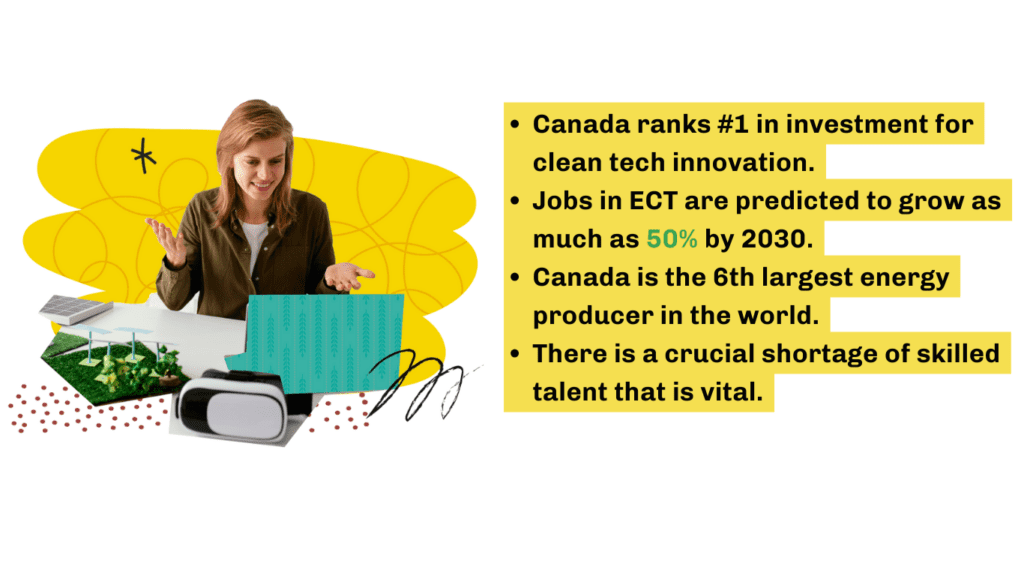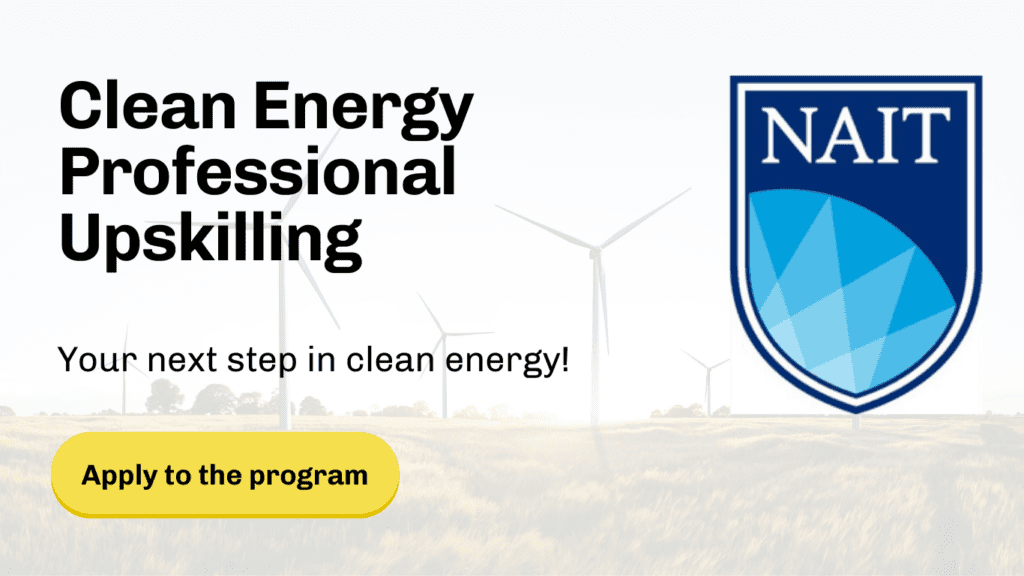The clean technology revolution is here
Are you keeping up with the new opportunities available in clean technology? You should be, because the number of new careers available to Canadian workers in what’s known as environmental and clean technology (ECT) is pretty much as wide as the horizon. In fact, according to some experts, jobs in ECT are predicted to grow as much as 50% by 2030. Meanwhile, around the world clean technology already represents trillions of dollars in investment and economic opportunity.
It’s a big deal here. According to statistics, Canada ranks #1 in investment for clean tech innovation and is ranked #16 globally when it comes to commercializing ECT. We think there are a couple of reasons why you should be considering a career in clean technology where you live.
The talent shortage
Back in 2021 and earlier, Canada was already attracting attention as a global leader in the clean technology revolution. Even then, experts warned that there had to be an adequate supply of skilled workers to secure the future of clean technology in the country, with reports pointing to a shortage of skilled talent vital to supporting the sector’s growth. The need for skilled talent continues to grow. In a report released by the Information and Communications Technology Council (ICTC) the authors write that:
“Labour shortages and high competition for talent are likely to persist, if not intensify, as the global demand for energy persists and Canada transitions to net-zero. Steady upward pressure on the labour market requires a robust and continuous stream of talent.”
 Clean Energy Professional Upskilling Program by NAIT
Clean Energy Professional Upskilling Program by NAIT
Addressing these and other skills gaps is exactly what Upskill Canada is doing right now. Upskill Canada is powered by Palette Skills, a national nonprofit that’s dedicated to providing pathways for people who want to transition into great careers. Recently, we’ve joined with the Northern Alberta Institute of Technology (NAIT) to deliver an innovative upskilling program that’s focussed on building much-needed talent for clean technology in the energy sector.
It’s not just another training course. That’s because along with Palette Skills, Upskill Canada believes that the key to upskilling success is about working closely with industry and employers in innovative sectors to meet their talent needs quickly.
The Clean Energy Professional Upskilling Program is a 16-week program designed to give participants a comprehensive education in the production, distribution, safety, and application of clean technology and fuels. The program delves into the operation and maintenance of carbon capture and utilization facilities, and includes hands-on, work-integrated learning assignments with industry partners. Participants will be able to showcase their knowledge to potential employers and apply acquired skills in actual workplace settings. The goal is to rapidly build great talent to meet Canada’s needs in this critical sector.
Canada is an energy giant
If you live in a province like Alberta, Saskatchewan, or even Newfoundland you already know that Canada punches well above its weight when it comes to energy. In fact, the country is the 6th largest energy producer in the world, with the sector contributing nearly 12% of GDP in 2022. Additionally we produced $240.5 billion worth of energy exports around the world in the same year.
But as we all know, the production and consumption of energy—particularly from fossil fuels—plays a dominant role in climate change globally. That’s why clean technology is so critical for Canada’s economic future. By the terms of international treaties like the Paris Agreement, the world community has agreed to significantly reduce greenhouse gas emissions by 2030, in an effort to keep the rise in global temperatures below 2%, reducing the impact of climate change on people and the environment. Clean technology can help us get there.
Getting to zero
Governments at all levels in Canada have recognized the need to address the climate crisis. In many ways, various policy initiatives in this area simply reflect Canada’s longstanding and widespread commitment to sustainability and the environment. At the federal level, this commitment has been secured by an ambitious piece of legislation called the Canadian Net-Zero Emissions Accountability Act which is designed to achieve net-zero GHG (greenhouse gasses) across the country by 2050.

Why is this so important? According to many experts simply phasing out fossil fuels is impractical, because we simply cannot get there quickly enough. Instead, Canada and the world needs clean technology solutions that can be applied now to help us in what will be a decades-long journey away from fossil fuels. Whether it’s about finding better ways to reduce carbon emissions from fossil fuels or making our transportation networks more efficient, ECT is a vital bridge to our net-zero future.
Clean technology will be everywhere
But before you think that ECT is only relevant to the energy sector, take a moment to consider all the areas of the economy where clean technology can be applied to increase efficiency, boost productivity and competitiveness, and reduce emissions. From waste management, battery manufacturing, to carbon sequestration and beyond, the demand for innovative solutions to address GHG emissions and environmental pollution extends throughout the economy.
Making the transition
So what does this mean for you, and for the communities where you live? It means a lot, especially if you’re already working in the energy sector. That’s because the energy industry needs clean tech to improve sustainability as Canadian companies and governments work to reach emissions reduction targets. And it needs the people with the skills who can get us there.
The good news is that a career change from traditional oil and gas to implementing clean technology solutions is closer and more accessible than you think. That’s because many people working in oil and gas, hydroelectric and similar sectors already have many of the transferable skills required for a career in clean technology. And when it comes down to it, your career in clean technology may have you working with companies and processes you’re already familiar with. It’s just a matter of upskilling!









